February, Fevrier; my love-hate relationship with language learning
Will I ever get to be filthy and funny in French?
After thirty years of learning French, I’ve accepted that it will be a lifelong endeavor—a task that, realistically, will never be fully achieved, nailed, or neatly ticked off my to-do list. And I am okay with this. There are creeping improvements—new verbs and adjectives slotted into my roster of sayable (though not always writable) French things. I recently re-enrolled in a French language class, hoping to be dragged into a more polished linguistic version of myself—one able to tackle sentences like, “I would have liked to have said that,” without a frantic pause before falling back on my trusted present tense.
Going into that class, I felt confident, maybe even a touch too confident. I had passed the informal placement test and was deemed a C1-level French speaker, supposedly capable of expressing myself spontaneously and fluently. If I’m honest, though, I was also buoyed by the genuine adulation that comes with being a British person who speaks another language. You are a marvel, a diamond in the rough (my words, not theirs). On top of this, the French—whilst somewhat disdainful toward those struggling to learn their language—are undeniably impressed if you can actually speak it. I had become accustomed to day-to-day interactions ending with, “Vous êtes de quelle origine? Vous parlez très bien le français !”. And to be adored by a people normally so aloof and difficult to impress is a drug in itself, filling you with a titillating sense of grandiosity.
So, I went back to class. It all started well with general chit-chat and introductions, a deceptively smooth beginning that gave no hint of the struggles looming ahead. This part of the discourse, I have nailed. Also, working in wine is a form of catnip for a French language class, further boosting my confidence as I fluently discuss a topic I know inside out. From here on in, however, the weeks began to unravel. We were reading a novel—something unusually sexy and salacious for a language class—but I had to look up every second word, which somewhat dulled the allure of said sexy salaciousness. Reading homework became lengthy and arduous. Grammar prep? Shelved indefinitely. Meanwhile, a creeping sense of self-doubt and bubbling frustration washed hot and sticky through my veins.
Then, in one class, after weeks of mounting frustration and silent struggles, I threw what I can only describe as a stifled tantrum. We had been given a text to read and discuss in groups. And so we read—or at least, they read while I tried to read. After five minutes, I had ascertained that we were on an island, someone was suffering from an 18th-century disease like diphtheria, and there were sharks. Beyond that, I was lost. Then came the questions, and with them, the easy, jovial chatter of my classmates. Our lovely, smiling teacher joined, asking for my thoughts. Sullenly, I retorted that I didn’t understand the text or anything that was going on. It was not my finest hour, made worse by the tender, well-meaning attempts of my classmates to explain it to me. But the damage was done—my confidence frayed, my ego bruised. I spent the remainder of the class in a grim, childish silence.
Once again, my relationship with this language had humbled me, reminding me—publicly, no less—that I still had a long way to go to master it.
This particularly fraying experience came just days before I hit the road for three weeks, fully immersed in wine and all things French. My ego was still tender, but I revelled in the language—buoyed by my ability to understand and participate once again. Yes, it was exhausting and, at times, overwhelming; keeping up was hard enough, let alone trying to have a personality. Have you ever tried to be funny in a second language? Ever attempted a quip or a perfectly timed dose of sarcasm? It’s brutal. And for those who know me, I thrive on quippy stories laced with filth and innuendo. I am nowhere near able to convey that in French—though, considering the professional setting I was in, perhaps that’s for the best. However, while I can’t be funny or filthy in French, I do take comfort in knowing that my accent is considered très mignon. That counts as a personality, right?
Dites-moi ce que vous voulez. Tell me what you want.
Bar struggling to have a personality in French, these weeks of salons and tastings were a deep-dive into the myriad of ways that we speak about wine. This industry really does have its own language - a sort of linguistic eco-system that is laced with French terminology, no matter which country you’re in. I know a plethora of people that speak no French but are fluent in wine French, or Cellar French if you will. They can talk about elevage (ageing), they know a lot about vessels - inox (steel), beton (concrete), barriques (barrels) or foudres (big barrels) - as well as being versed in the topics of levures indigènes (wild yeast), soutirage (racking) and remontage (pump overs)remontage. The French words have become a totally acceptable currency when talking about wine. Is it perhaps one of the only times when peppering your sentence with French words doesn’t make you sound like a wanker? Alas, probably not.
Boring winemaking French aside, what I really enjoyed was the litany of words used to describe wine in French. And with spring and summer teetering on the edge of being, and no doubt, hoards of you descending on this country, I thought that a meandering tour through some of my favourite ways to describe wine could be fun, and maybe quite helpful?
NB a lot of these words can be used to describe both red, white and rosé wines.. So once you’ve chosen a colour, these words will help give your request depth and dimension! And feel free to revisit my September substack on asking for what you want - the French way.
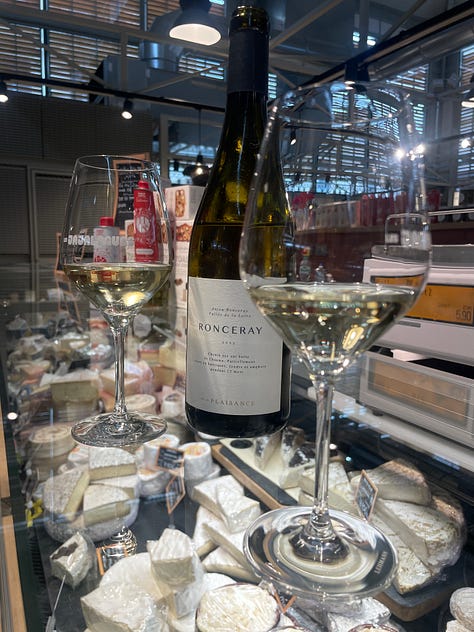
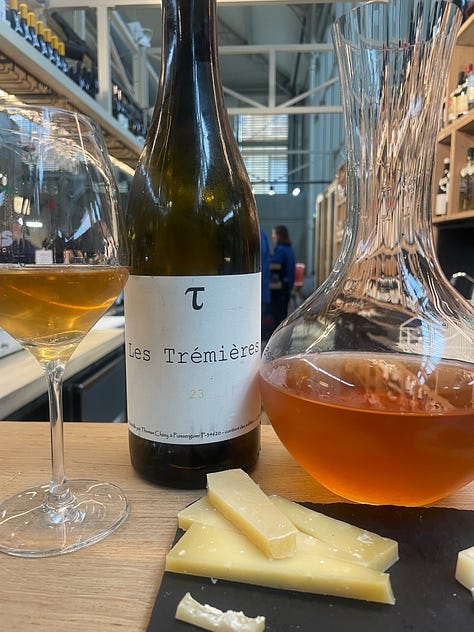
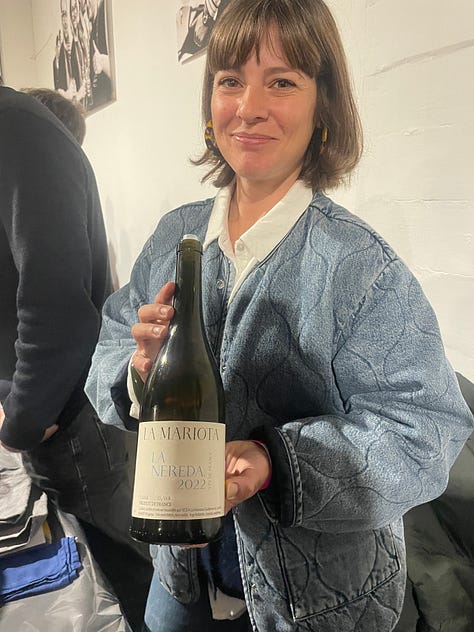
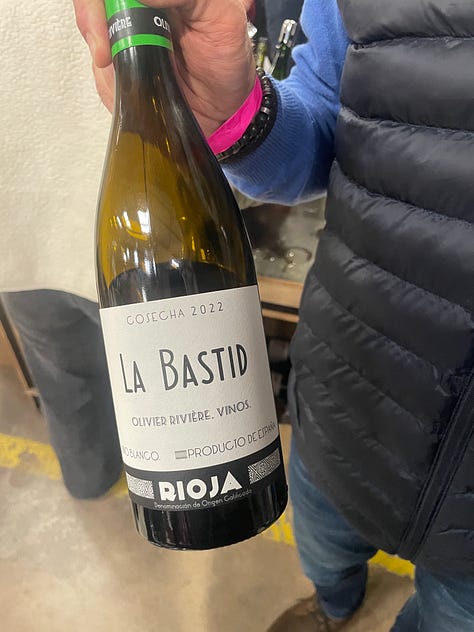
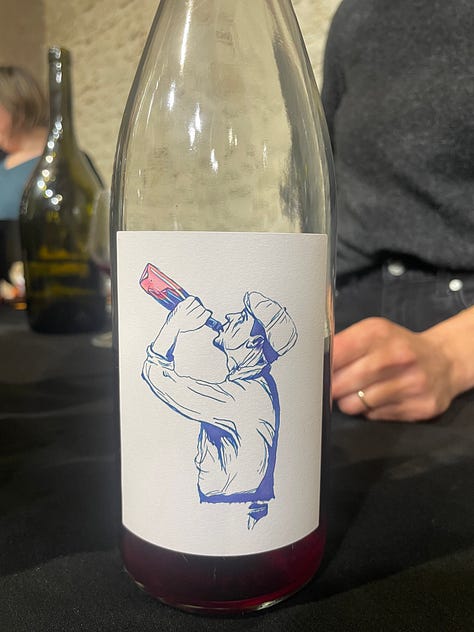
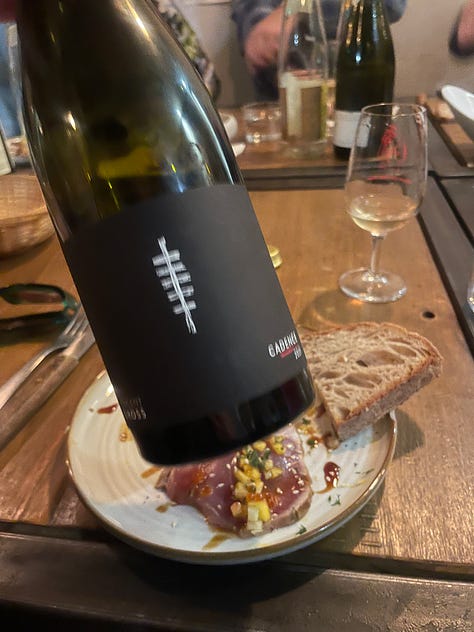
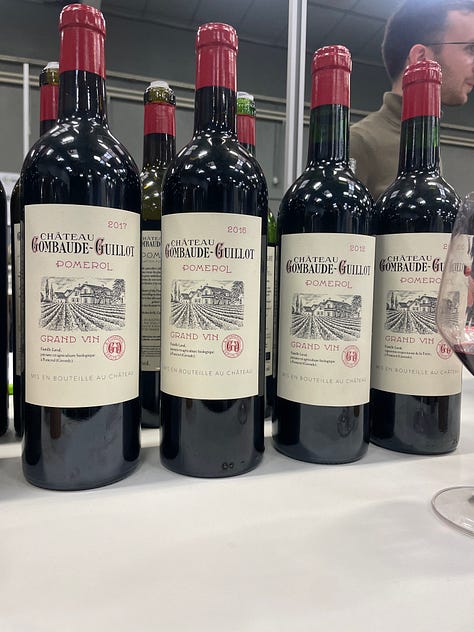
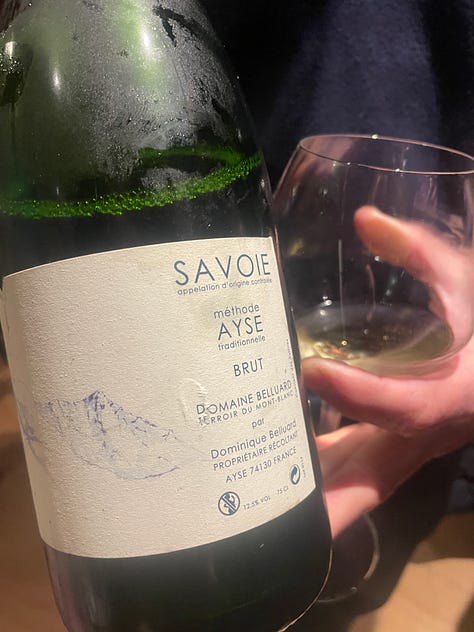
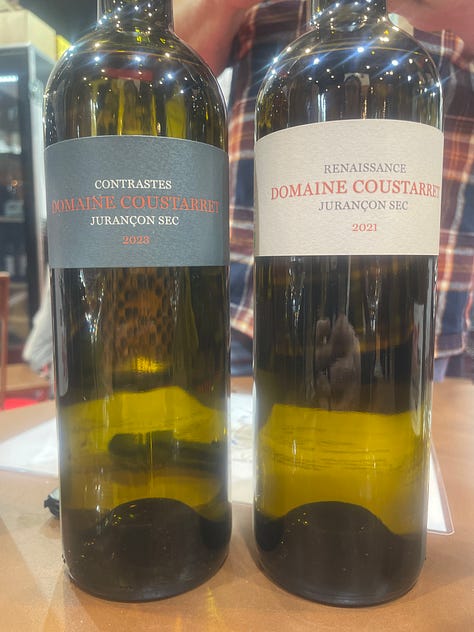
Salinité - Salinity. As you can see, pretty much the same in English, but it is to say that there is this moreish salty edge. Think drinkable ocean spray like Picpoul. A very fashionable wine word right now. Connections to biodynamics also, but more on that another day.
Ciselé - Chiselled / defined. You want something in high definition; clear cut and vibrant. This makes me think of cool climates Chablis and mountainous Jura Savagnin.
Crocante - a satisfying word that means crunchy and is a way of describing a wine with fresh fruit and lots of mouth watering acidity. Think eating fresh berries off a tree. Perfect for chilled reds and grapes like Gamay.
Digest - this is a sort of philosophical idea of the wine being nourishing and balanced. Most likely will result in a more natural-leaning wine with nice mineralité (another fashun wine word) where there has been a holistic approach from the vine to the glass.
Épicé - spicy. A nice one to flex for the orange wine lovers out there. Less of the chilli-spice, more of the exotic, aromatic spice of clove, cardamon and cinimaon.
Velouté - a delightful way to say velvety. This one really is for more full-bodied reds, to describe soft, pillowy tannins that you can sink into. Not to be confused with sauce of the same name.
Charnu - Fleshy. Plump. Fat. A personal favourite on my love affair with sumptuous, mouth-filling wines. This gives me a sense of luxury and seduction, and a touch of oak ageing. The Nigella of wines perhaps?
Also, one of my favourite takeaways from the last month is finding out that the French have a word to say RINSE WITH WINE! Of course they do. Used when you need to give your glass a refresh after a more powerful wine. The word is aviner - puis-je aviner? May I rinse with wine? Mais oui!
Now, if you’re anything like me, you are happy to (occasionally) relinquish control of your wine choices, these are handful or helpful phrases to cut through the proverbial fat..
Vin de soif - thirst quenching wine
Facile à boire - easy drinking
C’est votre choix - It’s your call
Il suffit de le faire froid et délicieux - Just make it cold and delicious
And with that, I wish you bon courage for the impending season of drinking exactly what you want on terraces and in restaurants throughout France!
Bisous x

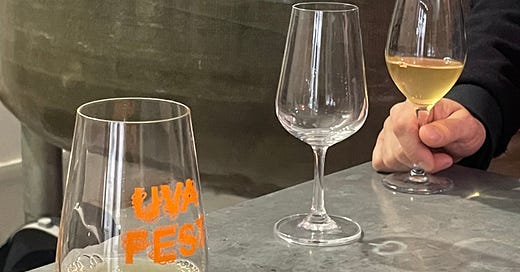


Genuinely a highlight of my month. Just keeps getting better.
Crocante was big last year, ideally used to describe wines from hot vintages that shouldn't be but are because...terroir. The girls and boys in Bourgogne all avowed to gourmand, delivered with a Gallic shrug